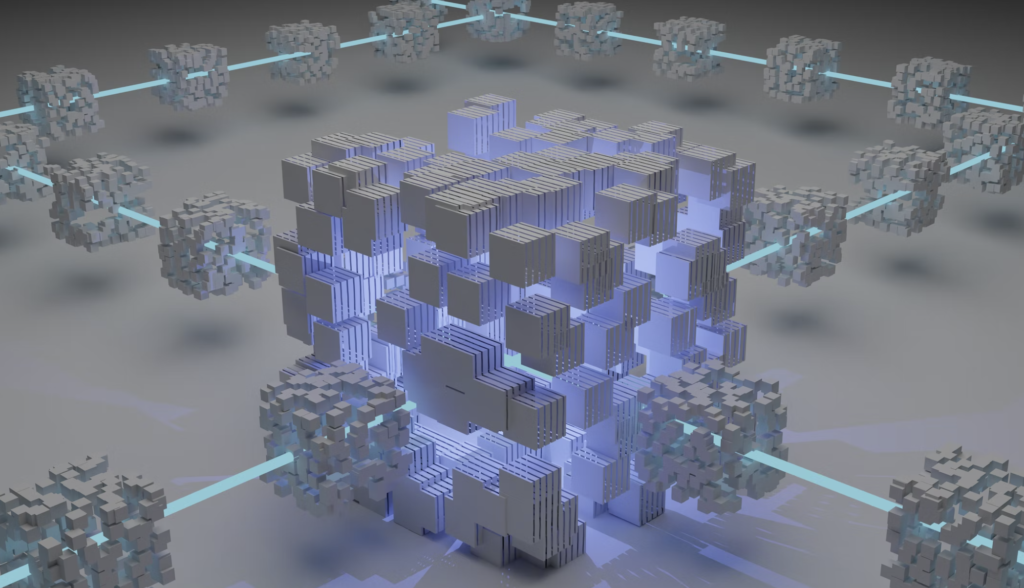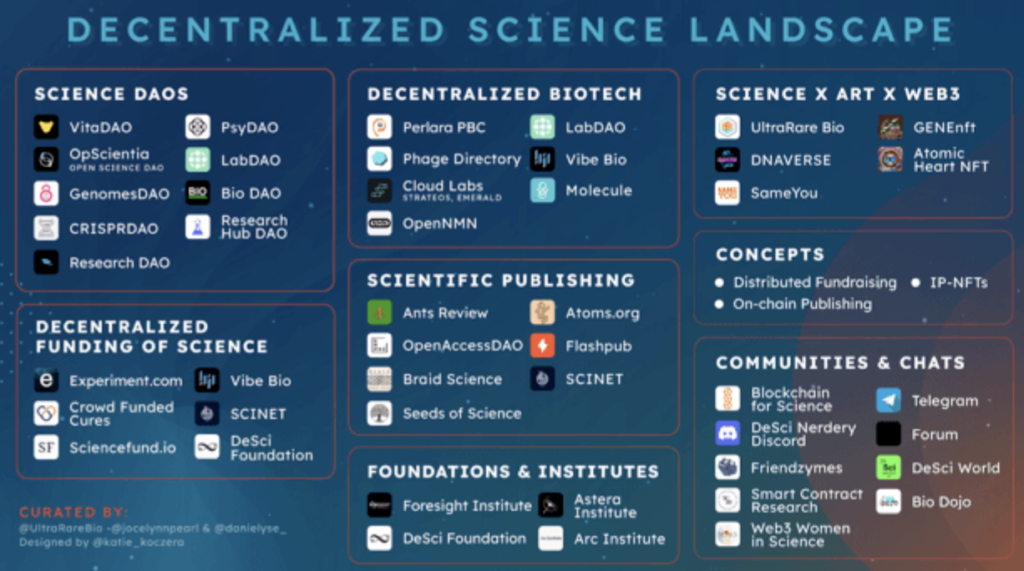With the arrival and growth of blockchain, several industries started to aim for openness, transparency, and decentralization. In a short period of time, blockchain from bitcoin and payment systems started to open up more and more dimensions of its usefulness to humanity, decentralizing money and increasing access to the realm of art and creativity for talented people. NFT, DeFi, the development of meta universes and web 3.0, so it is not surprising that the next discovery was DeSci – decentralized science.
Recent years have seen breakthroughs in many areas of science – such as the discovery of RNA vaccines, advances in genetic engineering, and successful experiments with fusion. But whether science itself is evolving as a fundamental field, or whether, on the contrary, its long-established system is slowing the emergence of important new research, I will examine in a new article.
In 2021, the creation of DAOs became popular, which led to the emergence of many scientific decentralized autonomous organizations. All of them are divided by their areas of activity. DeSci DAOs can work on funding projects, creating decentralized platforms for publishing and storing scientific papers, or conducting peer reviews of materials.
What are the problems in science and research world
Science is very centralized and often controlled by state institutions. Scientists’ hands are essentially tied because they depend on funding and approval from certain regulators who decide what to research and what not to research. It is always easy to work with industries, such as medicine and IT, but there are rogue fields, such as climate change research. The community of scientists that promotes the new current of DeSci talk about several global problems of modern science.

A successful business makes more money than it spends. Usually the difference between incoming revenues and expenses–the profit–is distributed among the owners as a return for the initial risks they took, including investments in equipment and materials, marketing, and employee salaries. Getting this money initially can be difficult, and usually requires a loan or investment from someone who needs to be convinced in advance that the money and effort will be worth it. In business, the definition of success is unambiguous: you either make money or you don’t.
But scientific research, especially fundamental research, is more of a long-term game. Success is much harder to measure in the short term, and even failure can push science forward. If, after a long and expensive clinical trial, researchers conclude that a drug doesn’t work, is that a failure? Although funders don’t get their money back, the knowledge gained may be useful for the next experiment, which may well turn out to be a huge success. But the economics of research, based solely on dollars, have no way of making up for the initial failed attempt.
One of the biggest challenges is funding fundamental research. Scientists spend a lot of time filling out grant applications, but may never see money for their ideas because their field touches someone else’s business interests, their ranking is not high enough in the global community, or the research area does not care about state institutions.
Another problem has to do with access to research information. It is expensive to place a publication in most influential scientific journals, so not all talented people can afford to tell the world about their discovery. For example, an article in the prestigious medical journal The Lancet costs $6500 and an article in Nature costs $11000. In addition, these journals are sometimes criticized for their dependence on the National Institutes of Health or other sources of funding.
The third problem is political interference in science and a lack of transparency. The approach to research is often subjective. This also applies to conditional lists of approved scientists and areas of science that high ranking officials in ministries want to develop, and various conspiracy theories about the influence of big pharma on lobbying their interests in the study of finding cures for chronic diseases.
Is blockchain the answer?
Underneath the financial façade of modern cryptocurrencies lies a unique technological framework that can be applied to more than just money – an anonymous (distributed) and stateless database called blockchain. Intelligent programming based on unbreakable cryptographic coding allows blockchain to securely store new types of intellectual property without supervisors or intermediaries: non-interchangeable tokens (aka NFTs), decentralized financial structures (DeFi) that are taking over many of the traditional functions of banks and brokers, and decentralized autonomous organizations (DAOs).

The DAO network instead of centralized science can help solve the problems
DeSci is betting on DAOs – stand-alone, autonomous organizations that will solve separate challenges related to scientific research. And the variety of tools that blockchain provides will help make science more independent.
Use DeFi tools to solve research funding problems
Already existing scientific DAOs provide several funding options, from crowdfunding and stacking research tokens, to selling utilitarian NFTs. Smart contracts, for instance, allow for a portion of the profits from scientific breakthroughs that are commercially successful to be returned to the DAO. Another example has to do with fundraising for scientific projects – in theory, anyone with a rare disease would be able to more easily participate in funding research to find a cure.
Eliminate the middleman between researchers and reviewers.
Currently, scientists review their colleagues’ work for free, and the profits are captured by an intermediary – some kind of scientific community or journal. By doing away with the pricey middleman, blockchain plus smart contracts would be able to link scientists with reviewers all over the world. Science would advance more quickly.
Obtaining funding.
Nowadays, scientists spend up to half of their working time writing applications and being interviewed for grants. Whether they get funding or not depends on the Hirsch index and the subjective evaluation of the commission. The reviewers look at how many publications and citations the scientist has had and decide whether they can trust him.
But the quality of articles is not always taken into account, and the potential of research is determined by the subjective evaluation of the inspectors. Because of this, young scientists have a low chance of receiving grants, because the commissions prefer already established specialists. As a result, some researchers focus on writing large amounts of small materials for publication rather than on the quality of their research. This phenomenon is called the funding crisis.
DeSci is offering scientists a share for participating in research and developing the platform with DAO tokens. They would be rewarded according to the value of their contribution. The more their data is used by other scientists, the more value they will receive. And funding for new research will be available from decentralized foundations. A scientist submits an application to the DAO and the community jointly decides by vote whether the research has potential and is worth allocating funds for it.

Unbiased verification of a scientist’s reputation.
Right now, scientists’ reputations depend on what is called the h-index, which takes into account the number of publications and significant awards. This method is not bad in and of itself, but it has drawbacks. For instance, in order to receive financing, some scientists must publish more articles, regardless of the caliber of their research. Publishing for the sake of ranking is an empty job that hinders science. DeSci activists propose replacing the h-index with the NFT, which would take into account not only an author’s publications, but also other important work, such as expertise, teaching successes, mentoring, and participation in research by other scientists.
Make science truly open to the world.
Encourage scientists from around the world to join teams of like-minded scientists, regardless of their background or the political climate in their countries. For example, in the form of online co-laboratories and cloud labs. This borderless sharing of knowledge will drive progress – scientists will be able to find solutions to fundamental problems faster, publish collaborative results, and protect authorship through the opportunities that NFTs provide.
NFT for your intellectual property rights
Here’s how DeSci works: anyone who creates a unit of knowledge that can be useful to science can file an NFT to establish ownership. This knowledge can take many forms, whether it’s a traditional scientific paper, for example, or something simpler, like an Excel file containing survey results. Just as an artist might release an NFT version of a painting, this DeSci NFT is a non-removable, permanent record of when and how it was created, and can be bought or sold like any other token.
A scientist who relies on the work of another scientist can acknowledge this fact by pointing to that other scientist’s NFT. In this sense, DeSci’s NFTs are similar to the existing system of citation in scientific publications, where scientists carefully list references to the work they have relied on in their current paper. But unlike citations, NFTs can apply to anything of scientific value and can be explicit in how they allocate merit. If I release an NFT to announce the results of my recent glucose experiments, and someone later cites my contribution to their own research, the NFT they release will help to thank me by acknowledging and pointing out the share of my contribution and my merit. If, in the end, a life-saving drug is created based on all this, I will automatically become the owner of even a tiny fraction of the resulting income.
Importantly, my share is preserved even if my contribution later turns out to be a dead end. Similarly, my total share of the end result reflects the share of those who develop my work. This is similar to how modern academics look at the number of citations as a measure of importance, with one key difference: any intellectual property and contributions to a common cause can be shared by all participants, even if those participants are competitors. This is no longer just a “winner-take-all” model.
DeSci DAOs operate in a similar way. Instead of funding a traditional laboratory at a university or company with a hierarchical structure headed by a principal investigator or director and a formal hiring process requiring advanced degrees or other credentials, anyone can join and participate in a DeSci lab.
DeSci DAO (distributed autonomous organization) terms will define tasks and rewards paid in tokens – all fixed on the blockchain. Complete a task – get tokens. Of course, some of the tasks will require special knowledge, training, or equipment, just like in a real lab, but no one can stop you from trying. When a series of tasks creates intellectual property, ownership passes to the entire DAO, with each member’s share proportional to the number of tokens they own. If this intellectual property is sold or licensed, the income goes back to the DAO and the token holders.
What scientific challenges are already being addressed by DeSci
Although decentralized science is still in its early stages, organizations that link scientists all over the world are already forming. A number of foundations, research institutions, and platforms for the publication of scientific data make up the DeSci ecosystem.

Some DAOs work to address particular issues with the scientific system. For instance, to provide a solution to the funding issue, to offer a venue for the publication of scientific research, to assemble an impartial board of experts, and so forth. Other DAOs concentrate on certain branches of science, such longevity research, cutting-edge medicine, or issues related to the climate. Several organizations are shown here as examples.
The Molecule Project is a fundraising platform for biotechnology research. Right now there are about 40 scientists on the site looking for funds for their projects. Anyone can donate and support important future discoveries. For example, the search for antibodies to the still incurable Alzheimer’s disease, an effective treatment for autoimmune diseases, and psoriasis therapy are among the studies. Several projects have already raised the necessary funds for the first phase of trials.
VitaDAO is exploring life extension. Longevity is one of the popular topics for DeSci and is easily raising the necessary funds. Already 5,000 scientists have gathered under the society’s wing, 200+ projects have been published, and over $2.5 million has been raised in a short period of time.
A platform for generating money for biotechnology research is called The Molecule Project. About 40 scientists are currently on the website asking for funding for their studies. Anyone can contribute and aid significant new discoveries in the future. Among the studies are those looking for antibodies to treat Alzheimer’s disease, which is currently incurable, finding a cure for autoimmune illnesses, and treating psoriasis. The money required for the initial round of trials has already been raised through a number of campaigns.
VitaDAO is researching ways to prolong life. A popular subject for DeSci that is successfully obtaining the required money is longevity. The association has already attracted 5,000 scientists, published more than 200 projects, and raised more than $2.5 million in a short period of time.
Initially, the finances come to the DAO from sponsors. They can also sell research rights – they create an IP-NFT to do this. This is a patent token with which DAOs can own, license, and transact with intellectual property.
Also, some DeSci-platforms may charge a small fee to publish on their website. And the proceeds are sent to a DeFi-stacking protocol, in which the coins make a profit in percentage per annum, like a bank deposit. Later, these profits are paid to scientists for participating in the development of the platform.
The value of the research is determined by the decentralized community of scientists who are part of the DAO. The organization allocates assets for research, and once the results are available, it uses them for implementation outside of the scientific community. The DAO then makes a profit and again funds the assets into projects.
To this day, DeSci is experimenting with blockchain technology in an attempt to improve the scientific environment and science in general. With the new tools, DeSci expects to empower scientists and achieve new scientific results to accelerate progress








